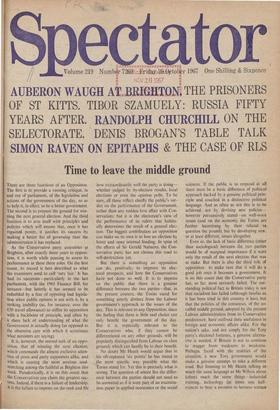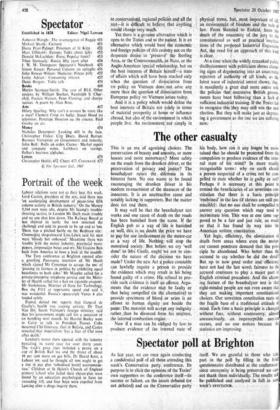Time to leave the middle ground
There are three functions of an Opposition. The first is to provide a running critique, in and out of parliament, of the legislation and actions of the government of the day, so as to help it, in effect. to be a better government. The second is to prepare' the ground for win- ning the next general election. And the third function is to arm itself with principles and policies which will ensure that, once it has regained power, it justifies its success by making a better fist of governing than the ad ministration it has replaced.
As the Conservative party assembles at Brighton, after exactly three years in opposi- tion, it is worth while pausing to assess its performance in these three roles. On the first count, its record is best described as what the examiners used to call 'very fair.' It has had its successes—particularly in the last parliament, with the 1965 Finance Bill, for instance—but latterly it • has seemed to be enfeebled by a fear of opposing bad legisla- tion when public opinion is not with it, by a striking inability. (as, for instance, over the £50 travel allowance) to stiffen its opposition with a backbone of principle, and often by • a sheer lack of understanding of what the Government is actually doing (as opposed to the obsessive care with which it scrutinises what ministers are saying).
It is, however, the second task of an oppo- sition, that of winning the next election, which commands the almost exclusive atten- tion of press and party supporters alike, and which is causing the most anxious soul- . searching among the faithful at Brighton this week. Paradoxically, it is on this count that the Conservatives can claim the greatest suc- cess. Indeed, if there is a failure of leadership, it is the failure to impress on the rank and file how extraordinarily well the party is doing—. whether judged by by-election results, local elections or even the opinion polls. To be sure, all these reflect chiefly the public's ver- dict on the performance of the Government, rather than any sudden love affair with Con- servatism: but it is the electorate's view of the performance of its rulers that habitu- ally determines the result of a general elec- tion. The biggest contribution an opposition can make on its own is to lose an election by bitter and open internal feuding. En spite of the efforts of Sir Gerald Nabarro, the Con- servative party has not chosen this road to self-destruction yet.
But there is something an opposition can do, positively, to improve its elec- toral prospects, and here the Conservatives have not done so well. It is to impress on the public that there is a genuine difference between the two parties—that, in the present context, the Tories stand for something utterly distinct from the Labour government's approach to the issues of the day. This is relevant to any Opposition, since the feeling that there is little real choice can only benefit the government of the day. But it is especially relevant to the Conservatives who, if they cannot be differentiated on any other grounds. will be popularly distinguished from Labour on class grounds which can hardly be to their benefit.
No doubt Mr Heath would argue that in his oft-repeated 'six points' he has stated in the most specific way possible what the Tories stand for. Yet this is precisely what is wrong. The question of where lies the differ- ence between the parties should not need to be answered as if it were part of an examina- tion paper in applied economics or the social sciences. If the public is to respond at all there must be a basic difference of political approach backed by a genuine political prin- ciple and couched in a distinctive political language. And as often as not this is to be achieved. not by devising new policies— however persuasively stated —on well-worn issues (and on the economy the Tories are further hamstrung by their refusal to., question the pound), but by developing new, or at least different, issues altogether.
Even so, the lack of basic difference (other than sociological) between the two parties would be of marginal importance if it were only the result of the next election that was at stake. But there is also the third role of opposition : to make sure that it will do a good job once it becomes a government. It is on this count that the Conservative party has, so far, most seriously failed. The out- standing political fact in Britain today is not that socialism has failed (although insofar as it has been tried in this country it has), but that the policies of the consensus, of the so- called middle ground, adopted by the present Labour administration from its Conservative predecessor, have outlived their usefulness in foreign and economic affairs alike. For the nation's sake, and not simply for the Tory party's electoral fortunes, a genuine alterna- tive is needed, if Britain is not to continue to stagger from weakness to weakness. Perhaps, faced with the realities of the situation, a new Tory government would make a genuine attempt to take a different road. But listening to Mr Heath talking in much the same language as Mr Wilson about (often) much the same things —industrial training, technology (at times one half- expects to hear a promise to harness science to conservatism), regional polici4s and all the restit is difficult to believe that anything would change very much. - Yet there is a genuine alternative which is open to the Tories and to the nation. It is an -alternative which would base the economic 'and foreign policies of this country not on the desperate desire to 'preservf the Sterling Area, or the Commonwealth, Or Nato, or the Anglo-American 'special relationship, but on the best interests of Britain herself =--a state of affairs which will have been reached only When the question of dissociation from us policy on Vietnam does not. arise any more than the qbestion of dissociation from European policy on Vietnam iarises -today. And. it is. a policy which- would define the best interests of Britain net Solely in terms of material prosperity at hone or influence abroad, but.also of the environment in which people live. An environment; not simply in physical terms, but, most important of all, an environment of freedom and the 'rule of law. From Stansted to Enfield, from the death of the unanimity of the jury to the constitutional as well as practical implica. Lions of the proposed Industrial Expansion Act„ the need fok. an appreach of this kind is clear.
At a time when the widely remarked public disillusionment with politicians shows alarm. ing signs of degenerating into an anarchistic rejection of authority -of all kinds, as the latest wave of industrial Unrest shoWs, titre is manifestly a great deal more amiss with the policies that successive. British govern- ments -have been folloWing than a lack of sufficient industrial training: If the Tories fail - to recognise this ',they may still win the next election. But they will make just as depress. ing a government as the one we are suffering now.



































 Previous page
Previous page